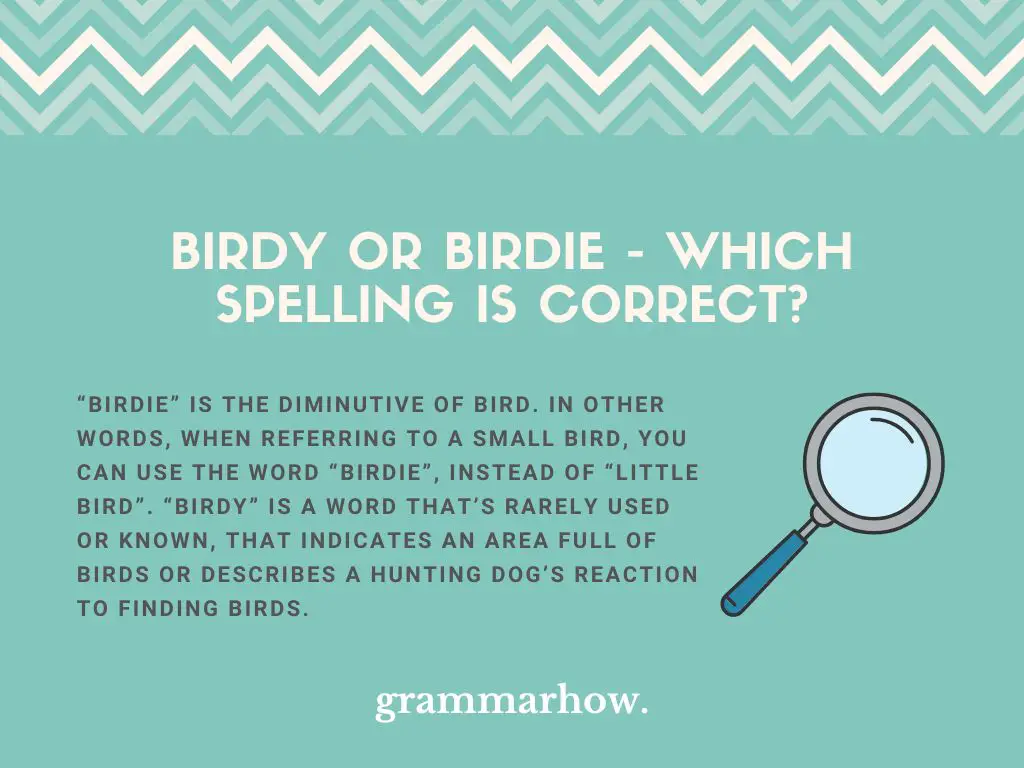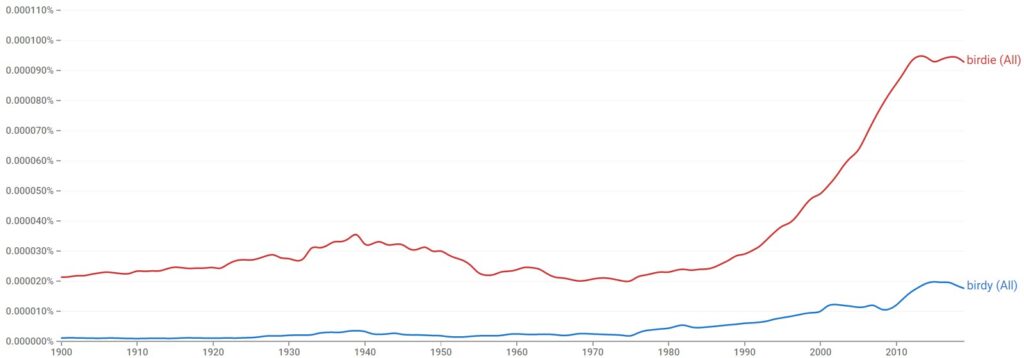Diminutives can be tricky sometimes. For example, when describing a small bird, should we say “Birdy” or “Birdie”?
Actually, we’d like to know if both “Birdy” and “Birdie” as words we can use, what’s their meaning and how can we use them.
Birdy or Birdie – Which Spelling Is Correct?
“Birdie” is the diminutive of bird. In other words, when referring to a small bird, you can use the word “Birdie”, instead of “little bird”. “Birdy” is a word that’s rarely used or known, that indicates an area full of birds or describes a hunting dog’s reaction to finding birds.

It’s less complicated than it originally sounds. So let’s begin by looking at some examples:
- The kids excitedly observed the birdy outside the window. (incorrect)
- The kids excitedly observed the birdie outside the window.
- The dogs were clearly getting birdy.
- The dogs were clearly getting birdie. (incorrect)
The first set of sentences is about a small bird on a window that kids found and got excited about. “Birdy” is incorrect, and doesn’t express this idea. “Birdie” is the correct word to use here.
In the second set, dogs are getting excited about finding birds, in a hunting context. “Birdie” doesn’t fit the meaning here, and is consequently incorrect. The correct word is “Birdy”.
Birdy
“Birdy” is an adjective to describe dogs trained to hunt, when they find birds. It can also indicate something that is like or like that of a bird – as in pointing out a “birdy” characteristic. It can also indicate an area full of birds.
Keep in mind that, regardless of the scenario, “Birdy” is a word that isn’t commonly used. The Cambridge Dictionary doesn’t even contain a definition for it. One can be found on The Merriam-Webster Dictionary, and it agrees with what was presented above.
Let’s see some examples of the word “Birdy” in a sentence:
- When the dogs got birdy, we knew we had found the turkeys.
- When the dogs got excited, we knew we had found the turkeys.
- The costume looked birdy, but it was very badly done, so it didn’t work well.
- The costume resembled a bird, but it was very badly done, so it didn’t work well.
- When it’s mating season, those lakes get incredibly birdy.
- When it’s mating season, those lakes get incredibly crowded.
For every sentence that correctly contains the word “Birdy” we added another version (or option) formulated with a more current form, that would sound more modern.
Keep in mind that although “Birdy” is correct, it has a very specific use and rarely appears anywhere, including literature.
Birdie
“Birdie”, simply put, is the diminutive of a bird, and consequently means a small bird.
That’s the same definition found in The Cambridge Dictionary. Although this is also a word with a very specific use, it is much common to say “Birdie” as opposed to “little bird” or “small bird”, than it is to use the word “Birdy” in any context.
Take a look at the examples below:
- The birdie we saw yesterday was so beautiful.
- He carefully lifted the wounded birdie, and took it to a vet hospital.
- Harrison’s son begged him to get him a birdie.
- The birdies all flew together, making an incredible design in the sky.
- Kyle’s favorite birdie visited his home sometimes.
“Birdie” is actually a cuter way to address the birds, very kiddie-like.
Which Is Used the Most?
Which one of these two words is used more often, ‘Birdy” or “Birdie”? Take a look at the graph from Google Ngram Viewer below, and find out.

“Birdie” is used, in general, much more often than “Birdy”. It’s always been like that and we weren’t really surprised by it.
What made us a little surprised was the fact that the usage for “Birdy” seems to be increasing over the years, especially since 2010. Why do you think that would be the case?
Final Thoughts
“Birdy” and “Birdie” aren’t synonyms. “Birdie” is simply the diminutive of bird. Use it every time you need to indicate a “small bird”. “Birdy” relates to what is like or like that of a bird, a place full of birds or the reaction of hunting dogs to finding birds.

Martin holds a Master’s degree in Finance and International Business. He has six years of experience in professional communication with clients, executives, and colleagues. Furthermore, he has teaching experience from Aarhus University. Martin has been featured as an expert in communication and teaching on Forbes and Shopify. Read more about Martin here.

